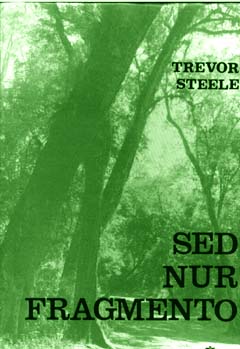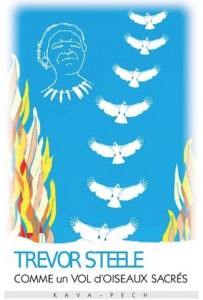Author interview: Trevor Steele Posted by Chuck Smith on Feb 3, 2014 in Interview, Literature
Today, I’m happy to have a chat with Trevor Steele, a famous Esperanto author from Australia. He had his first success with his novel Sed nur fragmento in 1987. His works are heavily influenced by his travels in Germany and Eastern Europe. In 2002, he served two years as the General Director of the Universal Esperanto Association. As of 2010, he joined the Akademio de Esperanto. So, on to the interview.
It’s quite impressive to see according to your official website that you’ve published books not only in Esperanto, but also in English and French! How did the experience differ in each language? In which language was your first book?
All of my books but one were first written in Esperanto and later I translated them into English. But these days I write parallel versions, always a chapter in Esperanto, then the English version. I say “version,” because I feel free to vary the text if I think it sounds better to do so. After each chapter I read the work to my wife Katja, whose first languages, Hungarian and Slovak, give her a different linguistic taste from mine. Her criticisms are often useful.
The experience of actually getting the books published is a very different story. I was lucky in that my first novel in Esperanto, Sed nur fragmento (the English version is called Fatal Empires) immediately established me as a name. I could probably offer my manuscripts to any publishing house in the Esperanto world and have them accepted.
But in English I had to submit myself to the humiliation of sending manuscripts to many publishers and receiving the same bland replies that betray the fact that nobody has actually read the work. I was also a victim of at least three scams – I’m pretty naïve!
Most publishers tell you they won’t touch manuscripts from unknown authors; you have to find an agent who “filters” for the publishers. But even finding an agent is difficult. I was lucky enough to find a reliable publishing house in Somerset, England called Mirador.
How did you come to the idea to publish in Esperanto? Were they translations or did you write originally in Esperanto?
Only one book of mine appeared originally in English: No Butterflies in Bergen-Belsen. The rest, as I said, were original works in Esperanto. Why did I choose the international language? That’s a long story, but to make it brief: I always wanted to write, but thought I had nothing new to say in English. But the fledgling literature of Esperanto has wide gaps for any new writer. Having gained recognition for my Esperanto books, I found I could add something to the enormous English literature as well.
For someone who wants to start reading your literature, where would you recommend that they start?
That’s hard to answer. It would depend on the interests of the reader. Most of my novels have a definite historical background: the colonial empires of the 19th century, Germany between the wars, Germany in 1968, Australia from 1939 on, Palestine in the first century (the Jesus novel Reluctant Messiah). There are a couple of collections of short stories with an Australian background (Remember and Forget and Australia felix – the latter not yet available in English). One book of mine is a series of travelogues involving many countries, Falantaj muroj, but mainly about the Soviet Union in its last year. It is sold out in Esperanto and not yet translated into English.
From what I remember, you once told me that even though you spoke fluent German, you would never feel confident writing in it, since it’s not your native language. So, to my surprise, I saw a French book among your bibliography. How did that come about?
The French book is a translation by a team of French Esperantists, so that’s no credit to me! I can write in German, and have done some original stories in that language. However, there is often a tiny doubt as to whether I have used exactly the right expression, so I have to check and check again, a wearisome process.
Also, I can’t forget that we first met in 2002 when you worked as the Director General of the Universal Esperanto Association and I was the World Esperanto Youth Organization’s full-time volunteer. What was it like working at UEA and what are you doing today?
Yes, in those days you were an ardent translator for the Esperanto version of Wikipedia, that I remember quite well. My time in Rotterdam is not one I look back upon with great nostalgia. After two years I had had enough, for various reasons. One reason was that I felt that as the director general in Rotterdam I was, paradoxically, not able to do much for Esperanto. When I was in Lithuania, for example, I taught the language to probably a thousand people, but in Rotterdam there was nothing doing in that regard. From afar it seems as if the director general is in a position of power, but I felt the opposite. And I am not fond of meetings, budgets, and other facets of administration, therefore not a very good manager.
On returning to Australia I went back to teaching German, then medieval and modern history at a Steiner school, but I’ve been retired for a couple of years owing to a breakdown in my health. However, I’m now fit again and launching another career as a writer in English – perhaps the hardest job of my life!
I wish you the best with your new career and thank you very much for the interview!

Build vocabulary, practice pronunciation, and more with Transparent Language Online. Available anytime, anywhere, on any device.
About the Author: Chuck Smith
I was born in the US, but Esperanto has led me all over the world. I started teaching myself Esperanto on a whim in 2001, not knowing how it would change my life. The timing couldn’t have been better; around that same time I discovered Wikipedia in it’s very early stages and launched the Esperanto version. When I decided to backpack through Europe, I found Esperanto speakers to host me. These connections led me to the Esperanto Youth Organization in Rotterdam, where I worked for a year, using Esperanto as my primary language. Though in recent years I’ve moved on to other endeavors like iOS development, I remain deeply engrained in the Esperanto community, and love keeping you informed of the latest news. The best thing that came from learning Esperanto has been the opportunity to connect with fellow speakers around the globe, so feel free to join in the conversation with a comment! I am now the founder and CTO of the social app Amikumu.







Comments:
Bob Felby:
Saluton Chuck !
Mi gratulas vin, vi estas unu el tiu, da kiuj ne estas sufiĉe !!!
James:
Dankon, Chuck! Kia bona intervjuo.
Paul Desailly:
Hi Chuck
Saluton kaj salaton dum la norda somero
Salaam-on kaj Shalom-on dum la tuta vivo
Trev’s decency prevents him from expanding as to all the pro bono work he and his dear Katja have given solo and as a team. Primarily, I’d say, what’s outstanding is their sacrifice over decades in the field teaching Dr. Zamenhof’s language of world peace. I’d like to add too a personal anecdote from about a decade and a half ago when I drove 3,000 km across the Nullarbor Plain from Melbourne to Perth seeking his help. While it’s true that the Steele’s and I do not share the same religious beliefs we categorically do share and defend the strict neutrality of the Esperanto movement vis-a-vis politics and religion. However that may be, Trevor hesitated not one moment in providing expert and prolonged help polishing my cumbersome Esperanto rendition of my original work – “Making World Peace Real: The Baha’i Faith and Esperanto”. Any assessment of that help (which I invite to peruse free of charge below) provided gratis to this amateur reveals his professionalism and more importantly – his generosity.
http://www.bahaindex.com/documents/Making_World_Peace_Real.pdf
http://www.bahaindex.com/documents/Realigas_la_Mondan_Pacon.pdf
Amike via
Paulo
Adelajdo
Australio
Valdas Banaitis:
ghuante la nigran kajeron kun rughkora titolo farde Julia Sigmond (2008) mi trafis koincdon de via reveno al Adelajdo kun la veno de mia filo Paulo antau jam 8 jaroj. Vi kaj li esperis ian apostoladon en Hindio, sed videble vi ambau konvinkighis, ke Australio estas lando el kiu oni neniam volas eliri.
El mia infaneco en mia memoro restis libro pri Miklukho M aklaj en Papua lando, kiun en 1945 eldonis mia instruisto. Al tiue eldonighis la taglibro de Ken Linton, kiu nomis Tok Pisin Melanezia Esperanto. Antau 25 (!) jaroj mi instruis en 3 horoj instruis al 2 studentoj (mia n (Paulon kaj lia kolego Valdo) la silaban-foneman bazon kaj korelativan sistemon de Esperanto kaj ili pasis la ekzamenon pri posedo de la dua fremda lingvo, postulata en la universitato, kaj neniam uzis Esperanton (kvankam Paulo naskigijis ekzakte 110 jarojn post Zam) En Hungario pli ol 6000 samcele diplomitoj havis tutan kurson kaj apenau 6 uzis la lingvon.
Zam avertis, ke la konstruio de Esperanto estas tute fremda por la tradicia gramatiko, sed li jam ne sciis kiel ekspliki kio infane estis tute klara al li laj pseudofaciligi priskribis Eon per lermeja gramatiko (por ke la lernanto ech ne rimarku ian diferencon, Tiu misgvido rezultis en la statistiko de Zlarko Tishljar “Mia sagho posr 50 jaroj de insttruado de Esperanto” (2012). Tamen Zamenhof neniam menciis instrudadon de Esperanto – li tute ne uzis la radikojn INSTRU kaj LECION koncerne Eon, chiam nur KOMPREN kaj memLERN (256 fojojn). Mi trafis gramatikajn fonemojn nur che Claude Gacond, srtukturan sintaksons che Lucien Tesniere, senleksikan strukturon de frazo che Carpenter Fries, kaj la postulon tute forgesi gramatikon lernitan en europa lernejo che John Jacob Thomas, la autoro de The Theory and Practise of Creo;le Grammar” (1869), sed kio el chio chi, se la termino “gramatikaj vortetoj” de Bertilo reastas evitentda lau PIV, kaj “gramatikaj silaboj” restas fremdaj al ambau statistikistoj de Esperanta silabiko…(Marc Bavant, kiu esperantigis mian filon Mario) kaj Osterdorp.
Reply me by vbanaitissurgmail
Valdas Banaitis:
ghuante la nigran kajeron kun rughkora titolo farde Julia Sigmond (2008) mi trafis koincdon de via reveno al Adelajdo kun la veno de mia filo Paulo antau jam 8 jaroj. Vi kaj li esperis ian apostoladon en Hindio, sed videble vi ambau konvinkighis, ke Australio estas lando el kiu oni neniam volas eliri.
El mia infaneco en mia memoro restis libro pri Miklukho M aklaj en Papua lando, kiun en 1945 eldonis mia instruisto. Al tiue eldonighis la taglibro de Ken Linton, kiu nomis Tok Pisin Melanezia Esperanto. Antau 25 (!) jaroj mi instruis en 3 horoj instruis al 2 studentoj (mia n (Paulon kaj lia kolego Valdo) la silaban-foneman bazon kaj korelativan sistemon de Esperanto kaj ili pasis la ekzamenon pri posedo de la dua fremda lingvo, postulata en la universitato, kaj neniam uzis Esperanton (kvankam Paulo naskigijis ekzakte 110 jarojn post Zam) En Hungario pli ol 6000 samcele diplomitoj havis tutan kurson kaj apenau 6 uzis la lingvon.
Zam avertis, ke la konstruio de Esperanto estas tute fremda por la tradicia gramatiko, sed li jam ne sciis kiel ekspliki kio infane estis tute klara al li laj pseudofaciligi priskribis Eon per lermeja gramatiko (por ke la lernanto ech ne rimarku ian diferencon, Tiu misgvido rezultis en la statistiko de Zlarko Tishljar “Mia sagho posr 50 jaroj de insttruado de Esperanto” (2012). Tamen Zamenhof neniam menciis instrudadon de Esperanto – li tute ne uzis la radikojn INSTRU kaj LECION koncerne Eon, chiam nur KOMPREN kaj memLERN (256 fojojn). Mi trafis gramatikajn fonemojn nur che Claude Gacond, srtukturan sintaksons che Lucien Tesniere, senleksikan strukturon de frazo che Carpenter Fries, kaj la postulon tute forgesi gramatikon lernitan en europa lernejo che John Jacob Thomas, la autoro de The Theory and Practise of Creo;le Grammar” (1869), sed kio el chio chi, se la termino “gramatikaj vortetoj” de Bertilo reastas evitentda lau PIV, kaj “gramatikaj silaboj” restas fremdaj al ambau statistikistoj de Esperanta silabiko…(Marc Bavant kaj Osterdorp).Reply me by vbanaitissurgmail